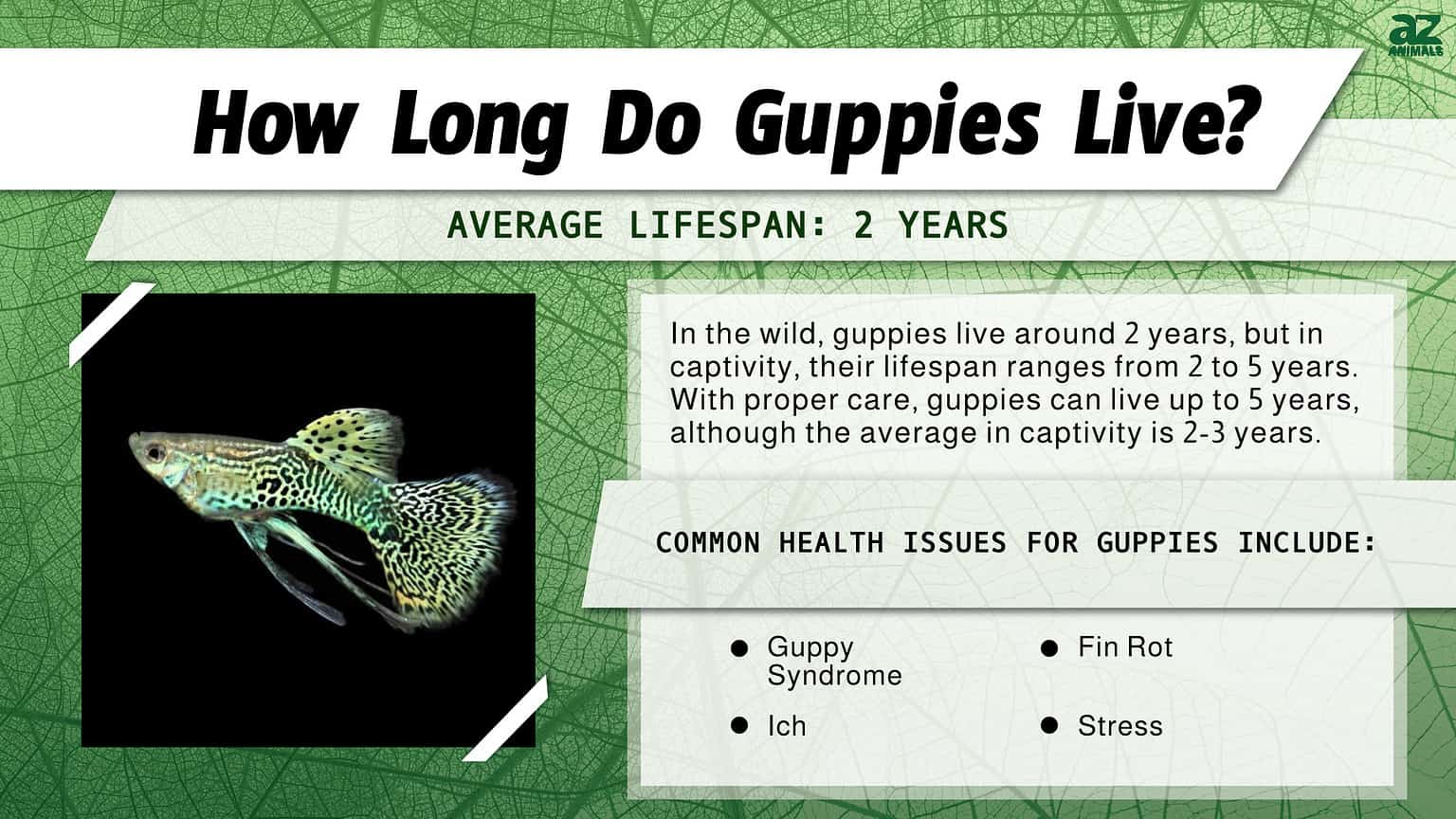Debunking the “Average” Guppy Lifespan
You’ve probably heard that guppies live for 1.5 to 3 years. While technically true, this range is so broad that it’s almost meaningless. Your guppy’s lifespan isn’t predetermined—it’s largely in your hands! Just like with any pet, proper care can significantly impact how long your guppies live and thrive.
This guide goes beyond the basics, giving you the expert knowledge to help your guppies live their best, longest lives. Forget the “average”—let’s aim for exceptional!
Factors That Determine How Long Guppies Live in a Tank
Think of your guppies’ lifespan as a puzzle. Many pieces contribute to the bigger picture. Let’s break down the key factors:
A. Tank Conditions: The Foundation of Guppy Health
1. Water Quality: The #1 Factor
- Why It Matters: Imagine living in a stagnant pool—that’s what poor water quality is like for guppies. They’re highly sensitive to changes in water parameters.
- Ideal Parameters:
- Temperature: 72-82°F (22-28°C)
- Quote: “It’s easier to keep a tank-kept guppy healthy since you have full control over the water parameters.” – Aqua Goodness
- pH: 6.8-7.8
- Ammonia & Nitrite: 0 ppm (parts per million)
- Nitrate: Below 20 ppm
- Temperature: 72-82°F (22-28°C)
- Maintenance:
- Water Changes: 25% weekly is crucial to remove waste products.
- Filtration: A reliable filter, appropriately sized for your tank, is essential for removing debris and harmful toxins.
2. Tank Size: Avoiding a Stressful Squeeze
- The Problem with Overcrowding: Cramming too many guppies into a small tank leads to stress, aggression, and faster deterioration of water quality.
- The Golden Rule: A minimum of 1 gallon of water per 1 inch of fish. For example, a 10-gallon tank should hold no more than 10 inches of fish, excluding tail length. A larger tank is always better!
- Stress Reduction: A spacious tank allows for natural territories and reduces the likelihood of conflicts.
3. Hiding Spaces: Essential for Security
- Natural Instincts: Guppies, like many fish, are prey animals in the wild. They instinctively seek out hiding spots to feel secure.
- Benefits of Hiding:
- Reduces stress and anxiety
- Provides refuge from aggressive tank mates
- Creates a more natural and enriching environment
- Creating Hiding Spots: Add plants (live or silk), caves, rocks, driftwood, or other decorations to give your guppies plenty of places to hide and explore.
B. Diet & Nutrition: Fueling a Long Life
- Variety is King: Just like humans, guppies thrive on a varied diet.
- Staple: High-quality flake food should make up the bulk of their diet.
- Supplements: Offer live or frozen foods like brine shrimp, daphnia, bloodworms, and even blanched vegetables for added nutrition and enrichment.
- Feeding Frequency: Overfeeding is a common mistake. It pollutes the water and can lead to health problems. Feed small amounts twice a day—your guppies should consume all the food within a couple of minutes.
C. Tank Mates: Choosing Compatible Companions
- Peaceful Community: Guppies are peaceful fish and do best in a community tank with other non-aggressive species.
- Quote: “Avoid any fish… prone to aggression. Guppy fish are easy targets.” – Tankarium
- Incompatible Tank Mates: Avoid known fin-nippers like barbs or large, aggressive species that might view guppies as food.
- Guppy Ratio: To reduce breeding stress and aggression, keep a ratio of approximately 3 female guppies for every 1 male guppy. This helps to distribute the males’ attention and creates a more harmonious environment.
D. Genetics & Age: Factors Beyond Your Control
- Lifespan Potential: Some guppy strains are naturally predisposed to longer lifespans due to selective breeding. If you’re looking for guppies with the potential to live for 4-5 years or more, seek out reputable breeders who can provide information about their guppies’ lineage.
- Senior Guppies: As guppies age, they may slow down, their colors might fade slightly, and their bodies might show subtle changes.
- Quote: “Generally, a senior guppy’s nutritional needs don’t change.” – Aqua Goodness.
- While their diet doesn’t change significantly, maintaining pristine water quality becomes even more critical for senior guppies.
Common Threats to Guppy Lifespan (and How to Avoid Them)
- Poor Water Quality: The #1 guppy killer! Regularly testing water parameters and performing partial water changes are non-negotiable for a healthy tank.
- Stress: Chronic stress weakens the immune system, making guppies more vulnerable to diseases. Overcrowding, aggressive tank mates, and a lack of hiding places are common culprits.
- Disease: While less common in a well-maintained tank, diseases like Ich (white spot disease) and fin rot can be fatal. Quarantine new fish and treat illnesses promptly.
- Predation: If you have larger or more aggressive tank mates, guppies, especially fry, can become an easy meal. Choose tank mates carefully.
10 Tips to Help Your Guppies Live Longer
- Invest in a Quality Filter: Choose a filter that’s appropriately sized for your tank and provides both mechanical and biological filtration.
- Heater for Consistency: A heater is essential for maintaining a stable water temperature, especially in colder climates.
- Water Changes Are Key: Perform a 25% water change every week to remove waste products and replenish essential minerals.
- Don’t Overcrowd the Tank: Follow the 1 gallon per inch of fish rule or, even better, opt for a larger tank.
- Research Tank Mates Thoroughly: Ensure all species in your community tank are compatible in terms of temperament, size, and water parameters.
- Provide a Varied and Nutritious Diet: A mix of high-quality flake food, live or frozen foods, and occasional blanched vegetables will keep your guppies happy and healthy.
- Create Plenty of Hiding Spots: Plants, caves, rocks, and driftwood all provide security and reduce stress.
- Observe Daily for Signs of Illness or Stress: Early detection is crucial for successful treatment.
- Quarantine New Fish: Before introducing new fish to your main tank, keep them in a separate quarantine tank for at least two weeks to observe them for any signs of disease.
- Don’t Overbreed! If you don’t want to deal with a population explosion, consider keeping only male or female guppies, or provide a separate breeding tank.
Why Are My Guppies Dying? Troubleshooting Common Problems
Even with the best intentions, guppy owners sometimes face challenges. Here are some common reasons why guppies die and what you can do:
- Sudden Water Changes: Drastically changing water parameters can shock guppies and lead to death. Always make gradual changes when adding water or adjusting temperature.
- Uncycled Tank: A new tank needs to go through a process called cycling to establish beneficial bacteria. These bacteria break down harmful ammonia and nitrites. Adding fish to an uncycled tank can be fatal.
- Overfeeding: Excess food decays in the tank, producing harmful toxins. Feed small amounts twice a day and remove any uneaten food.
- Disease Outbreaks: If you notice signs of disease (e.g., white spots, fin rot, lethargy), take action immediately. Consult a veterinarian or experienced fish keeper for advice on diagnosis and treatment.
Conclusion: It’s About Quality, Not Just Quantity
While we can’t guarantee your guppies will live forever, by following the guidelines in this article, you can dramatically increase their chances of living long, healthy lives. Remember, your guppies’ well-being is directly tied to the care you provide. Make informed decisions, prioritize their needs, and enjoy the vibrant beauty they bring to your aquarium.
Remember those internal links you wanted to include? Here they are, seamlessly integrated:
- Concerned about lifespan in other breeds? Wondering why golden retrievers are dying younger than they used to? This article will tell you why.
- Interested in unique animal hybrids? You might also be curious about the grolar grizzly bear. This article will tell you all about it.
- Unveiling the Enigma: Mansoureh Khojasteh Bagherzadeh’s Public Appearances & Private Life in Iran - July 18, 2025
- Unveiling the Mystery: Mansoureh Khojasteh Bagherzadeh’s Husband: A Rare Glimpse into a Private Life - July 18, 2025
- Unveiling Masoud Khamenei’s Mother: Power, Influence, and Iran’s Future - July 18, 2025
















